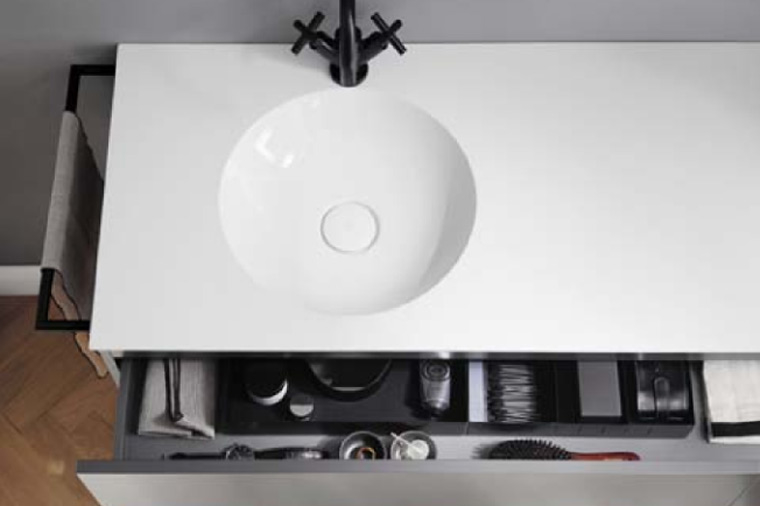Over the last decades, bathrooms have evolved from merely functional rooms to a comfortable feel-good zone offering relaxation and rest. High quality, easy-to-clean materials reduce cleaning efforts and provide a long term contribution to more enjoyment in the bathroom. The brand manufacturers from the Blue Responsibility initiative know which innovative materials provide more hygiene in bathrooms.
Limescale in the shower, water spots on the mirror and dirt residue on the tap – no one likes these and other annoying cleaning tasks. After ironing (39 %) and cleaning windows (31 %), cleaning bathrooms (20 %) is one of the most unpopular household chores. If dirt adheres less easily, bathrooms require cleaning less often and cleaning is easier and quicker. At the same time, less cleaning is more gentle on the environment.
High hygiene standards thanks to versatile, robust materials
Smooth, pore-free and hard materials are mostly resistant to dirt and limescale. Enamelled steel is a proven quality product for wash basins, shower trays and bathtubs. “The combination of steel and enamel is particularly resistant to abrasion, scratches and impact. It is also highly resistant to cosmetic and medical bath products,” Marcus Möllers from Kaldewei explains. “We only use natural, recyclable materials in our in-house enamel production” Möllers reports. The additional repellent effect works against dirt and limescale.
Mineral cast compound has been a popular material for around 30 years: it is used for shower trays and wash basins, among other things, as it is easy to care for and extremely sturdy. “Even if the material gets damaged, it is easy to repair,” Sabine Meissner from burgbad explains. A gel coating is applied to the roughened spot with a special repair set and then sanded. The polishing paste rounds off the results, making it easy to quickly remove scratches or dents, nicotine or nail polish stains.
Other German sanitaryware manufacturers use the robust and easy-to-clean Varicor material. It is extremely impact resistant and suitable for special hygiene requirements. “As a pore-free material, Varicor is an ideal combination of functionality and aesthetics,” Dirk Hagedorn from Keuco says. “The material is pleasing to the touch and can be easily cleaned with all common cleaning products.”
Classic materials glass and stainless steel still popular
Tried and tested materials such as stainless steel and glass are also used frequently. While recyclable stainless steel provides resistance to impact and wear, furniture and objects made of glass are elegant eyecatchers in bathrooms and yet robust and resistant. The smooth, closed glass surface is a particular advantage – it is hygienic, scratch resistant and robust. Glass is also sustainable from an ecological point of view: it can be 100 per cent recycled. “With normal use, glass shows virtually no signs of wear,” Veit Szpak from Mepa explains.
Elegant ceramics with innovative surface finishes
Special glazes and finishes from the German sanitaryware industry optimise classic ceramic objects. They give wash basins, toilets, bidets and urinals a surface that is easy to clean. “Our special glaze for ceramics provides a virtually pore-free and extremely smooth surface to which dirt can hardly cling. We call this passive cleanliness,” Volker Röttger from Keramag confirms. The surface finish from Keuco also allows fast care and cleaning – it prevents dirt and residue while letting water run off. Thomas Kreitel from Ideal Standard is happy about the quality seal awarded to the company's innovative surface finish by TÜV Rheinland, Berlin/Brandenburg. “The durability of the ceramics finish is a particularly convincing feature: with correct handling and care, the service life is comparable to that of an average bathroom.”
Clean solutions for public spaces
Hygiene standards and antibacterial surface materials are particularly important for sanitary installations in public spaces due to the extremely high level of use. “There is a reason why the easy-care material Miranit is one of the standard materials for public and semi-public spaces,” Verena Töpfer-König from Franke Aquarotter explains. The unbreakable mineral granite is cast without glue seams or joints. “It is ideal for creating modern, aesthetic sanitary rooms,” Töpfer-König continues. Miranit features very high resistance thanks to the smooth, pore-free and hygienic gel coat surface. Stains left by crayons, shoe polish, ink, lipstick – a polishing paste restores wash basins back to their original glory. An innovative surface finish for stainless steel products from Franke Aquarotter supports cleanliness in sanitary rooms: tiny nano particles adhere to molecules of brushed stainless steel and fill even the smallest unevenness. This micro structure makes fingerprints nearly invisible.
Ecological and social sustainability in bathrooms
Those who choose easy-to-clean materials from the great variety of materials early on will be able to enjoy their bathrooms for a long time. This also greatly reduces the use of cleaning products. “For one, this protects the environment,” Wolfgang Burchard from Blue Responsibility explains. “On the other hand, the innovative materials also reduce the time required for the unpopular cleaning chores. So the German sanitaryware industry provides more quality of life.”
Further details regarding this topic can be obtained on the manufacturers' websites www.dornbracht.com, www.franke.com/watersystems, www.geberit.de, www.kemper-olpe.de, www.mepa.de, www.schell.eu, www.syr.de und www.oventrop.com.
